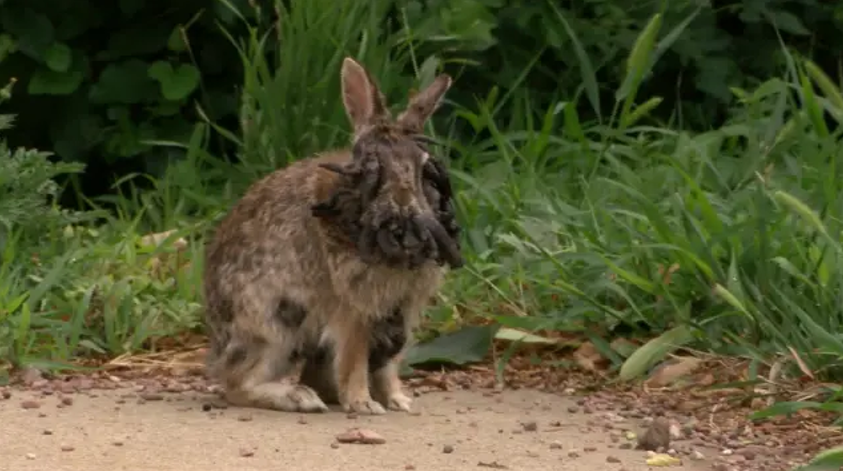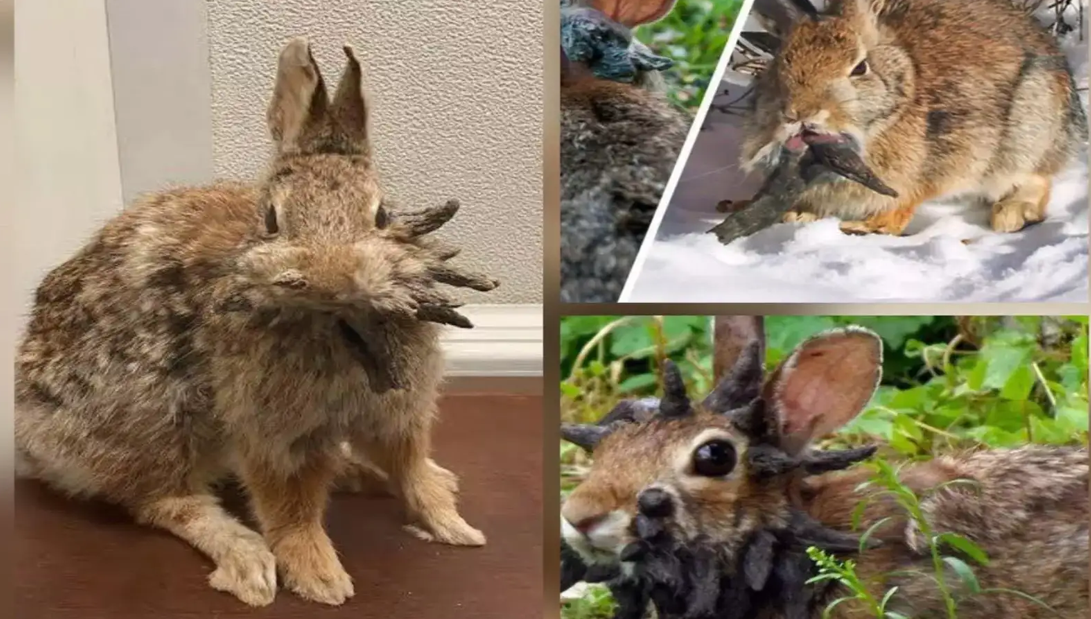Bizarre ‘tentacle rabbits’ spotted in Colorado have gone viral, leaving locals and scientists baffled. Here’s the truth behind the strange bunny sightings.
Residents of Fort Collins, Colorado, have reported seeing rabbits with strange, tentacle-like growths protruding from their faces. Wildlife officials have confirmed that the cause behind this is a virus. The condition is similar to benign cancerous cells and has no known cure. Wildlife officials recommend giving infected rabbits space and avoiding any attempts to help or handle them.
Residents in Fort Collins and other parts of Colorado have spotted wild rabbits with ‘scary’ horn-like and tentacle-shaped growths protruding from their heads and faces. Photos circulating on social media have startled locals. They show the animals with black, spiny structures resembling toothpicks or quills, sparking alarm and speculation about possible diseases.

Wildlife experts revealed that the unsettling condition is caused by Shope papilloma virus, a disease that creates wart-like tumors on rabbits, often around the head, ears, and eyelids. While the growths may look disturbing, officials stressed they do not pose a threat to humans, pets, or other wildlife.
The virus only spreads between rabbits, typically through bites from insects such as mosquitoes and ticks. According to the University of Missouri, the condition is a DNA virus ‘seen most frequently in cottontail rabbits of the Midwest with outbreaks in domestic rabbits’.
What is Shope Papilloma Virus?
The virus causes benign wart-like tumors, but in some cases, these can become malignant (cancerous). While generally not harmful to the rabbit’s overall health, tumors can create problems if they obstruct the mouth, nose, or eyes.

The disease is relatively common in wild rabbit populations, particularly during warmer months when insect activity is high.
There is no known cure for the virus; surgical removal of tumors is sometimes performed for domestic rabbits.
Colorado Parks and Wildlife is advising residents to keep their distance. Thye are not dangerous.
MAJOR CONCERN… Rabbits spotted invading parts of the US with weird tentacles sprouting from their heads due to virus…
— DramaAlert (@DramaAlert) August 12, 2025
Colorado officials are warning: "DO NOT TOUCH" pic.twitter.com/mx41MXPY5l
How can you avoid Shope Papilloma virus?
CPW stressed the virus spreads only between it and does not infect dogs, humans, or other wildlife. However, residents are being told to give the infected animals space.
The advice is to avoid any attempts to help, feed, or handle them, no matter how harmless they might seem. Head tumors in rabbits can be caused by conditions like Shope papilloma virus, which leads to wart-like growths that may become malignant.
These tumors often appear on the ears, eyelids, or other areas of the head and preventing insect exposure is key to reducing the risk.
The Shope Papilloma virus are spread by biting insects like mosquitoes and ticks and treatment usually involves surgical removal of growths. The virus is believed to be relatively common among wild rabbits, but the dramatic appearance of the growths has drawn more public attention.
Wildlife experts said the best course of action is to simply leave it alone and let nature take its course.
No cure, warns officials
The virus, according to CPW, causes wart-like protrusions that can resemble horns or tentacles. According to wildlife officials, the growths are caused by a virus that results in wart-like protrusions on it’s face or head. The condition is similar to benign cancerous cells and has no known cure, CPW said.
Wildlife officials emphasized that while the virus can spread between rabbits, it is not known to be contagious to humans, dogs, or other wildlife. They said it doesn’t hurt the rabbit, unless it grows on sensitive areas like their eyes or mouths.
Although the virus is not considered a threat to public health, wildlife officials recommend giving infected it space and avoiding any attempts to help or handle them.
While the growths generally don’t harm it, they can become problematic if they develop over sensitive areas like the eyes or mouth.

Can humans get CRPV?
According to US media reports, it was not the first time that South Dakota natives had spotted a horned or tentacled bunny in the wild. Such sightings happen annually, at least once, meaning the virus outbreak is not new. Veterinarians in the state have even treated a few by removing the growths, reports claimed. While it can spread from bunny to bunny, it is not capable of affecting humans or even bigger mammals like dogs. So, as long as you do not have domesticated rabbits, which are more vulnerable to the virus than those in the wild, there is nothing for you to fear.
What’s Behind the Creepy Mutation?
According to reports, a virus called the Shope papillomavirus (SPV) aka the cottontail rabbit papillomavirus (CRPV) is causing rabbits to grow such weird tentacles. This DNA virus primarily infects wild cottontail rabbits in the US, causing wart-like tumours that often appear around the head, face, and ears. These growths can resemble spikes, antlers, or fleshy tentacles.
Though the condition isn’t usually fatal, the growths can impair a rabbit’s vision, smell, and ability to eat, leaving them vulnerable to predators. In rare cases, the tumours can become cancerous. The virus spreads between rabbits through direct contact or via biting insects like mosquitoes, which often target fur-free areas of the head.
Also Read :
Covid-19 : JN.1 Variant on the Rise, Symptoms, Precautions, and What You Need to Know
Ashley Biden Divorce: The Real Reason Behind Her Split from Dr. Howard Krein

